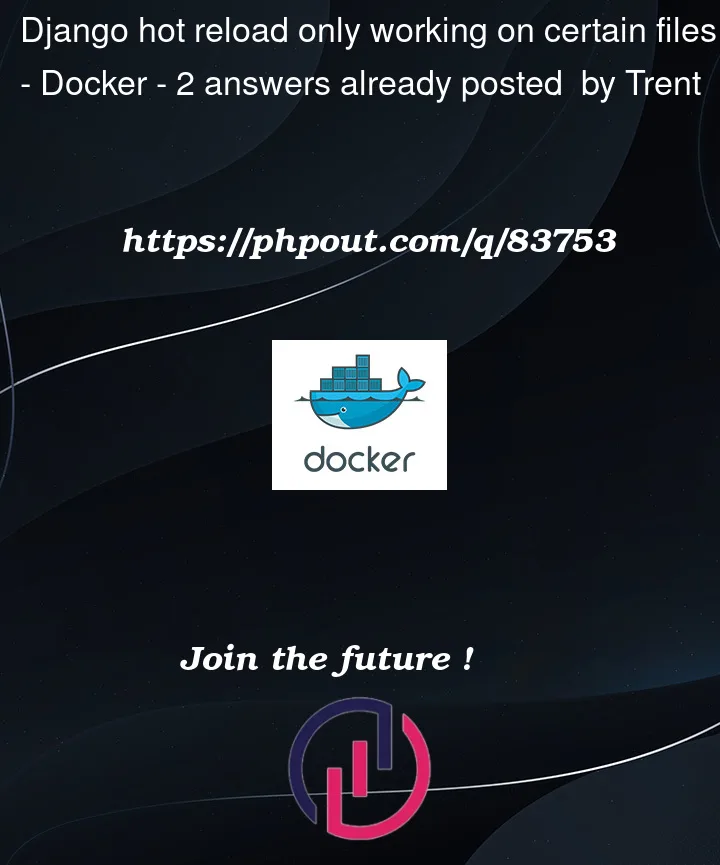I have this weird issue where not all file edits are being picked up by the hot reloader for Django.
I have this structure:
/
app/ ... apps in here.
config/settings.py
manage.py
Now, any changes to config/settings.py or manage.py will result in the django runserver reloading.
But any changes to files inside app/… don’t trigger a reload – I have to go and add a newline to manage.py and save (quite irritating).
Any ideas why this might be?
At first I thought it was a docker thing, and it was only picking up files in the base dir, but then changes to config/settings.py also trigger the reload, so clearly it can see deeper.
EDIT: Addition info
Django 3.2, PyCharm, MacOS – yes, all apps are in INSTALLED_APPS
I have another project that has the EXACT same structure and for some reason it works… I’m really stumped.
EDIT adding dc and dockerfile
FROM python:3.8-slim
ENV PYTHONUNBUFFERED 1
WORKDIR /app
COPY ./requirements /requirements
ARG pip_requirement_file
RUN apt-get update && apt-get install -y libjpeg62-turbo-dev zlib1g-dev gcc ca-certificates gcc postgresql-client sed xmlsec1 pax-utils && apt-get clean
RUN pip install --no-cache-dir -r /requirements/$pip_requirement_file
&& find /usr/local
( -type d -a -name test -o -name tests )
-o ( -type f -a -name '*.pyc' -o -name '*.pyo' )
-exec rm -rf '{}' +
# Copy requirements and install local one
RUN rm -rf /requirements
COPY ./compose/django/entrypoint.sh /entrypoint.sh
RUN sed -i 's/r//' /entrypoint.sh
RUN chmod +x /entrypoint.sh
COPY ./compose/django/start-server.sh /start-server.sh
RUN sed -i 's/r//' /start-server.sh
RUN chmod +x /start-server.sh
# Very specifically copy the files we want to avoid bloating the image.
COPY ./manage.py /app/
COPY ./app/ /app/app/
COPY ./admin_static/ /app/admin_static/
COPY ./config/ /app/config/
COPY ./database/ /app/database/
ENTRYPOINT ["/entrypoint.sh"]
CMD ["/start-server.sh"]
docker compose
services:
django:
container_name: django
build:
context: .
dockerfile: ./compose/django/Dockerfile
args:
pip_requirement_file: local.txt
depends_on:
- postgres
ports:
- "8000:8000"
links:
- postgres:postgres
volumes:
- .:/app
env_file: .env




2
Answers
I'd like to thank everyone for trying to help me solve this riddle that has been doing my head in.
I decided to strip both projects (old and new) back to see why the old worked and the new doesn't.
This is what was different.
Inside config/init.py on the old project, this line exists:
Inside the new project, this was missing.
When I add this in, hot reloading starts working for all files inside app/* ?????
It's working, but honestly, I have no idea why that would make a difference.
I am not 100% sure what the issue is, but offering this answer with a couple of things you can try:
There are reports that Pycharm will sometimes cause problems if it has been configured not to update the timestamps of files when saving them (there is a Preserve files timestamps setting to control this) which you could try toggling. An easy way to verify if this is the issue is to try editing a file with a different editor (or
touchthe file) and see if that triggers a reload – if it does then the issue is PyCharm.Note that the default
StatReloaderwill not work if file timestamps don’t change.Try installing
pywatchmanand the Watchman service, as mention in the documentation, which provides a much more efficient way to watch for changes thanStatReloaderwhich simply polls all files for changes every second – if it’s a large project it may be that theStatReloaderis just taking too long to spot changes.